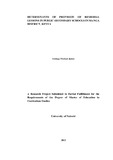| dc.description.abstract | The purpose of this study was to establish the determinants which make remedial lessons be provided in Manga district public secondary schools. The study was guided by five research objectives. The research objective sought to establish the various ways in which remedial lessons were carried out in public secondary schools; establish the extent to which key subjects lead to provision of remedial lessons; determine how increased chances to higher learning institutions result into provision of remedial lessons; find out how overload in the educational curriculum had led to provision of remedial lessons and determine the degree to which prestige among teachers and students influenced provision of remedial lessons in Manga district. The study adopted a descriptive survey design. The sample for the study was 35 teachers and 237 students who were sampled using systematic sampling method. Data were analysed by use of qualitative and quantitative techniques.
Findings revealed that remedial lessons were offered by majority of the schools. Remedial lesson were offered at the evening and they took less than one hour. Majority of teachers indicated that the remedial classes were given to the whole class and were offered to weak students. Remedial classes were an opportunity to cover the syllabus. The study further shows that teachers were serious in teaching during remedial lessons. Remedial lessons allowed students to master areas not mastered before. Teachers disagreed that remedial classes exist due to low level of teachers‟ salaries; teachers strongly agreed that the lessons exist due to increased competition for limited chances to higher institutions. The overloaded curriculum was also given as a reason for conducting remedial lessons. Findings further revealed that if teachers were in a position to decide, they would like private tuition to continue being given to students. Teachers added that remedial lessons created reputation to teachers and most often the reputation rests on the academic results they are able to achieve. This makes provision of remedial lessons something that brings some relief and balance. The study lastly concluded that if teachers were in a position to decide, they would like private tuition to continue being given to students.
Based on the findings, the study recommended that remedial lessons should be offered by the school and to the whole class as it helps learners remember what they had learnt in the previous lesson and further improve their understanding in class, and it gives teachers and students opportunity to cover the syllabus. Ample time should be provided to teachers during remedial lessons to boost performance in key subject areas such as Languages, Mathematics and Science.
Since not every school can provide specialist teachers in all subjects, remedial lessons should be provided to help students to overcome deficiencies in learning to comprehend and enjoy mainstream lessons enabling them to compete fairly with others. The researcher suggested that an investigation on challenges that face provision of remedial classes in school and a study on the influence of stakeholders‟ involvement in remedial classes to students‟ academic performance to be conducted for further studies. | en |

